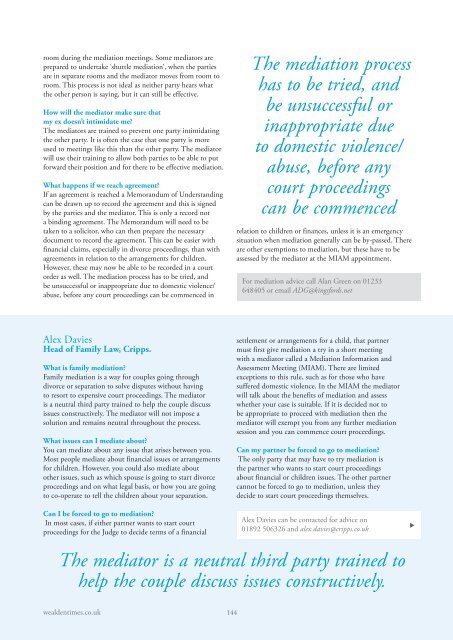Wealden Times | WT179 | January 2017 | Health & Beauty supplement inside
Wealden Times - The lifestyle magazine for the Weald
Wealden Times - The lifestyle magazine for the Weald
You also want an ePaper? Increase the reach of your titles
YUMPU automatically turns print PDFs into web optimized ePapers that Google loves.
oom during the mediation meetings. Some mediators are<br />
prepared to undertake ‘shuttle mediation’, when the parties<br />
are in separate rooms and the mediator moves from room to<br />
room. This process is not ideal as neither party hears what<br />
the other person is saying, but it can still be effective.<br />
How will the mediator make sure that<br />
my ex doesn’t intimidate me?<br />
The mediators are trained to prevent one party intimidating<br />
the other party. It is often the case that one party is more<br />
used to meetings like this than the other party. The mediator<br />
will use their training to allow both parties to be able to put<br />
forward their position and for there to be effective mediation.<br />
What happens if we reach agreement?<br />
If an agreement is reached a Memorandum of Understanding<br />
can be drawn up to record the agreement and this is signed<br />
by the parties and the mediator. This is only a record not<br />
a binding agreement. The Memorandum will need to be<br />
taken to a solicitor, who can then prepare the necessary<br />
document to record the agreement. This can be easier with<br />
financial claims, especially in divorce proceedings, than with<br />
agreements in relation to the arrangements for children.<br />
However, these may now be able to be recorded in a court<br />
order as well. The mediation process has to be tried, and<br />
be unsuccessful or inappropriate due to domestic violence/<br />
abuse, before any court proceedings can be commenced in<br />
The mediation process<br />
has to be tried, and<br />
be unsuccessful or<br />
inappropriate due<br />
to domestic violence/<br />
abuse, before any<br />
court proceedings<br />
can be commenced<br />
relation to children or finances, unless it is an emergency<br />
situation when mediation generally can be by-passed. There<br />
are other exemptions to mediation, but these have to be<br />
assessed by the mediator at the MIAM appointment.<br />
For mediation advice call Alan Green on 01233<br />
648405 or email ADG@kingsfords.net<br />
Alex Davies<br />
Head of Family Law, Cripps.<br />
What is family mediation?<br />
Family mediation is a way for couples going through<br />
divorce or separation to solve disputes without having<br />
to resort to expensive court proceedings. The mediator<br />
is a neutral third party trained to help the couple discuss<br />
issues constructively. The mediator will not impose a<br />
solution and remains neutral throughout the process.<br />
What issues can I mediate about?<br />
You can mediate about any issue that arises between you.<br />
Most people mediate about financial issues or arrangements<br />
for children. However, you could also mediate about<br />
other issues, such as which spouse is going to start divorce<br />
proceedings and on what legal basis, or how you are going<br />
to co-operate to tell the children about your separation.<br />
settlement or arrangements for a child, that partner<br />
must first give mediation a try in a short meeting<br />
with a mediator called a Mediation Information and<br />
Assessment Meeting (MIAM). There are limited<br />
exceptions to this rule, such as for those who have<br />
suffered domestic violence. In the MIAM the mediator<br />
will talk about the benefits of mediation and assess<br />
whether your case is suitable. If it is decided not to<br />
be appropriate to proceed with mediation then the<br />
mediator will exempt you from any further mediation<br />
session and you can commence court proceedings.<br />
Can my partner be forced to go to mediation?<br />
The only party that may have to try mediation is<br />
the partner who wants to start court proceedings<br />
about financial or children issues. The other partner<br />
cannot be forced to go to mediation, unless they<br />
decide to start court proceedings themselves.<br />
Can I be forced to go to mediation?<br />
In most cases, if either partner wants to start court<br />
proceedings for the Judge to decide terms of a financial<br />
Alex Davies can be contacted for advice on<br />
01892 506326 and alex.davies@cripps.co.uk<br />
<br />
The mediator is a neutral third party trained to<br />
help the couple discuss issues constructively.<br />
wealdentimes.co.uk<br />
144


















